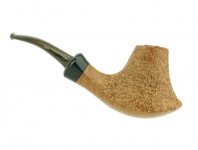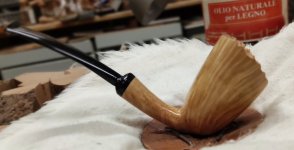Bingo. And and add to that "best" is very relative. "Best in what way?" is a very real question for a pipe maker. Mimmo grades in a way other mills don't - and it's handy as hell. Most mills grade with a primo (poor), extra (not bad), extra extra (pretty nice), and some kind of ultra premium on top of that. Factories buy 'primo", pipe carvers buy extra or extra extra. Mimmo has another grade, his top being 1 and 2, and his "grade 3" are not poor, per se, but selected for sandblasting - they are lighter, have wider grain spacing. That's a nice grading system. Add consistency into the mix and you can see what serious pipe makers want to buy from Mimmo. (And he's super accommodating, if you ask for 11 very long pieces for Canadians, he'll provide that).
This pipe was a Mimmo #2, originally I had thought to blast it, but when the briar is this perfect, naturally you leave it alone. Is that a typical #2? No.
This came out of a Spanish block graded as "extra" -
It happens. It also happens the other way. I've had blocks from Mimmo that I've cut a hole in, inspected, and thrown away. It's briar. It's nasty stuff, treacherous. I've had blocks from Algeria, Spain, Greece.... some you get a ripper out of, some you throw in the bin.
There is a person behind every block of briar. It's all hand cut. Every pipe is handled by at least one person too, there's no truly "machine made" pipes, no machine that you dump blocks in one end and out come pipes on the other end. It's labor intensive. And that's what's so cool about particularly artisan pipes - you can know basically everyone right u the supply chain, you can talk to the pipe maker about what wood he or she is using and why, you can learn the regional differences in flavor between Algeria and Tuscany. It's wonderful.













